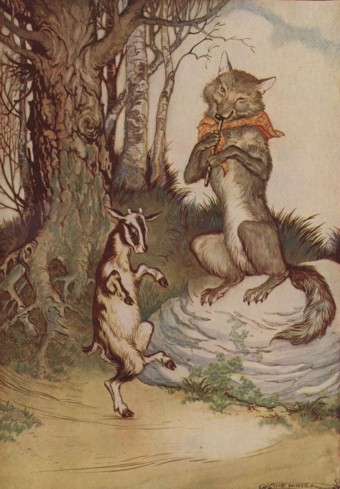Friday Fable. Aesop’s “THE WOLF AND THE KID”*
|
|

Caption: Illustration by Milo Winter, 1919.
“There was once a little Kid whose growing horns made him think he was a grown-up Billy Goat and able to take care of himself. So one evening when the flock started home from the pasture and his mother called, the Kid paid no heed and kept right on nibbling the tender grass. A little later when he lifted his head, the flock was gone.
He was all alone. The sun was sinking. Long shadows came creeping over the ground. A chilly little wind came creeping with them making scary noises in the grass. The Kid shivered as he thought of the terrible Wolf. Then he started wildly over the field, bleating for his mother. But not half-way, near a clump of trees, there was the Wolf!
The Kid knew there was little hope for him.
‘Please, Mr. Wolf,’ he said trembling, ‘I know you are going to eat me. But first please pipe me a tune, for I want to dance and be merry as long as I can.’
The Wolf liked the idea of a little music before eating, so he struck up a merry tune and the Kid leaped and frisked gaily.
Meanwhile, the flock was moving slowly homeward. In the still evening air the Wolf's piping carried far. The Shepherd Dogs pricked up their ears. They recognized the song the Wolf sings before a feast, and in a moment they were racing back to the pasture. The Wolf's song ended suddenly, and as he ran, with the Dogs at his heels, he called himself a fool for turning piper to please a Kid, when he should have stuck to his butcher's trade.”
“Do not let anything turn you from your purpose.”
While more a fairy tale than a fable in length and style, there’s no denying the kid puts one over on the wolf.
In the workplace, we can make the wolf’s mistake of becoming distracted to the point of negligence – the apt cliché of “taking one’s eye off the ball” - and wind up losing any gain. I encountered this with implementing organizational reforms. I’d make headway in one unit only to be distracted by the intractability of another. Upon reflection, it would have been better for me to focus solely on those units amenable to change. It was a waste of time to try to persuade - to “play my pipe” - those in opposition. Indeed the noise of my playing/pleading/cajoling drew others opposed to change. Instead, the undistracted success of the few open to change, would have helped in the long run to bring along the naysayers.
*Source: Aesop for Children (translator not identified). Illustrations by Milo Winter (1886-1956). Chicago: Rand McNally & Company, 1919. Available online at Project Gutenberg.
© 2015 John Lubans
 John Lubans - portrait by WSJ
John Lubans - portrait by WSJ